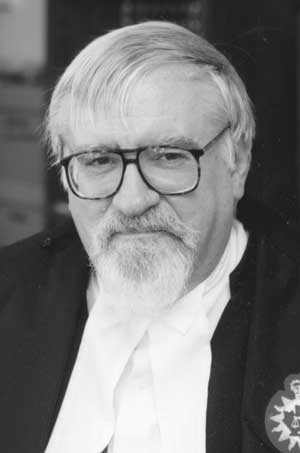Former Ontario premier David Peterson can still picture his old university roommate, Archie Campbell, relaxing on the couch after a few drinks.

Looking like Colonel Sanders in a white, three-piece suit and running shoes - an indication that he was in relaxation mode - Campbell would recite, word for word, defences from the greatest trials in the history of the Commonwealth.
Many things changed after that, but Campbell’s passion for the law and one-of-a-kind personality remained the same, say friends and colleagues of the highly respected and loved Superior Court of Ontario justice who died last week, shortly after his 65th birthday.
He was battling both lung disease and colon cancer, and was on a waiting list for a lung transplant when he died on April 17. Campbell was married with two children from a previous marriage.
Campbell dedicated his life to public service, eventually achieving his lifelong ambition of becoming a judge when he was appointed to the Superior Court of Ontario in 1986 following other significant positions, including senior Crown counsel and deputy attorney general for Ontario. From 1993 to 1996, he was regional senior justice of the Superior Court for the Toronto region.
Campbell presided over the 1996 public inquiry into the Paul Bernardo police investigation and the 2003 public inquiry into the SARS outbreak. His work on both commissions will help protect the public in the coming years, say his colleagues.
“Justice Campbell was entrusted with investigating and restoring public confidence in provincial institutions at a time when Ontarians felt most vulnerable,” says Attorney General Michael Bryant.
“[He] was a highly respected jurist who embodied the best characteristics of the bench: a deep knowledge and respect of the law, and the wisdom to apply it fairly.”
Campbell worked incredibly hard on the SARS commission even while he was dealing with both illnesses, says Douglas Hunt, who was senior counsel on the SARS commission. But he never complained.
“He always found humour even in his own adversity,” says Hunt.
“He was a remarkable guy, and, in many ways, inspirational in how he handled, with such grace, his own problems while continuing to work on providing recommendations that would assist us all. He will be sadly missed.”
Campbell was a remarkable legal scholar, says Peterson, who was premier of Ontario while Campbell was deputy attorney general. Peterson recommended that Campbell be appointed to the bench.
“The phrase ‘learned in the law’ does not apply to every lawyer, but it applied to Archie,” he says, adding that his longtime friend always wanted to be a judge.
“It was a noble ambition and he was a great judge. He was fair-minded. He was measured. He didn’t tilt the law. He understood the sanctity of the law and the importance of the law and that’s why he added so much.”
Ontario Chief Justice Roy McMurtry enjoyed a close friendship with Campbell that spanned half a century.
In fact, the last time many members of the legal community likely saw Campbell was on a video screen at a recent tribute dinner in McMurtry’s honour, where Campbell affectionately cracked jokes at his longtime friend’s expense.
For the better part of a decade, Campbell was a senior Crown lawyer and deputy attorney general while McMurtry was attorney general for Ontario.
“He’s been a large part of my life,” says McMurtry. “He was a remarkably special person. He was a giant in the legal community both as a lawyer and a judge.”
It will simply be impossible for anyone to forget him, says Toronto Regional Senior Justice Warren Winkler. He had the knack for making you feel that you were the only person that mattered.
“He remembered everything about you, all kinds of details. He didn’t really like talking about himself very much. He liked talking about other people.”
And he was knowledgeable about so many things and loved to talk.
“He had a photographic memory,” says Winkler. “If there was anything you wanted to know and you couldn’t remember, you could call Archie and he would remember. It could be some abstract poem or something that no one else would remember, but he would remember.”
The two men belonged to the same fishing club and Campbell was a larger-than-life personality even when surrounded by all the other characters at the club.
Winkler remembers watching him sit on a fishing dock in the wee hours of the morning carrying on conversations about fishing while wearing grey flannel pants, a white shirt, suspenders, and an old fashioned straw hat.
And his affinity for white suits didn’t stop after he was called to the bar. He often paired a white linen suit with a strange hat and an offbeat tie.
“He looked like a character out of a Tom Wolfe book,” Winkler says fondly.
“We’ll remember him for sure because there weren’t any other people in the world like him, let alone on the court.”
In lieu of flowers his family requests donations be made to the Toronto General & Western Hospital Foundation, General Surgery Research.

 Looking like Colonel Sanders in a white, three-piece suit and running shoes - an indication that he was in relaxation mode - Campbell would recite, word for word, defences from the greatest trials in the history of the Commonwealth.
Looking like Colonel Sanders in a white, three-piece suit and running shoes - an indication that he was in relaxation mode - Campbell would recite, word for word, defences from the greatest trials in the history of the Commonwealth.